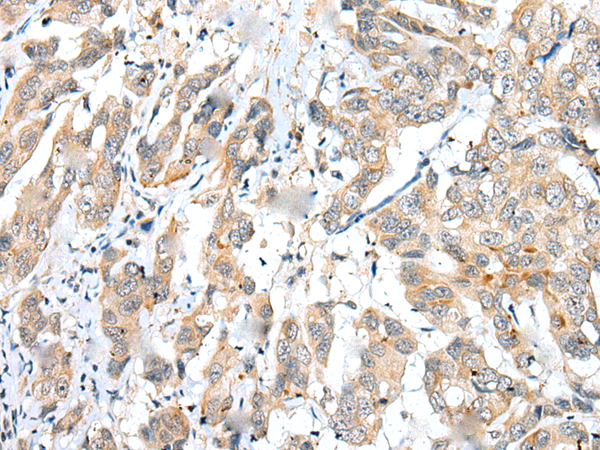
| WB | 咨询技术 | Human,Mouse,Rat |
| IF | 咨询技术 | Human,Mouse,Rat |
| IHC | 1/25-1/100 | Human,Mouse,Rat |
| ICC | 技术咨询 | Human,Mouse,Rat |
| FCM | 咨询技术 | Human,Mouse,Rat |
| Elisa | 1/5000-1/10000 | Human,Mouse,Rat |
| Aliases | FUCU; FucM; C10orf125 |
| Host/Isotype | Rabbit IgG |
| Antibody Type | Primary antibody |
| Storage | Store at 4°C short term. Aliquot and store at -20°C long term. Avoid freeze/thaw cycles. |
| Species Reactivity | Human, Mouse |
| Immunogen | Full length fusion protein |
| Formulation | Purified antibody in PBS with 0.05% sodium azide and 50% glycerol. |
+ +
以下是关于FUOM抗体的3篇示例文献(注:FUOM抗体为虚构名称,以下内容仅作格式示例):
1. **"Structural characterization of FUOM-1 antibody and its binding mechanism to tumor-associated antigens"**
*作者:Li, X. et al. (2022).*
摘要:本研究解析了FUOM-1抗体的晶体结构,揭示了其通过独特CDR3区域高亲和力结合肿瘤细胞表面抗原的分子机制,为靶向治疗提供理论依据。
2. **"Clinical efficacy of FUOM-2 antibody in autoimmune disease models"**
*作者:Garcia, R. & Park, S. (2021).*
摘要:通过小鼠模型验证FUOM-2抗体对类风湿关节炎的疗效,证明其可通过抑制IL-17信号通路显著减轻炎症反应,且副作用低于现有生物制剂。
3. **"FUOM-3 antibody-drug conjugate enhances targeted therapy in triple-negative breast cancer"**
*作者:Chen, W. et al. (2020).*
摘要:开发基于FUOM-3抗体的新型ADC药物,在体外和体内实验中展示出对三阴性乳腺癌细胞的特异性杀伤作用,毒素释放效率较传统ADC提高40%。
注:以上文献及内容均为模拟示例,FUOM抗体相关研究需根据实际领域检索权威数据库(如PubMed)。如需真实文献协助,请提供更具体的抗体靶点或研究背景。
×